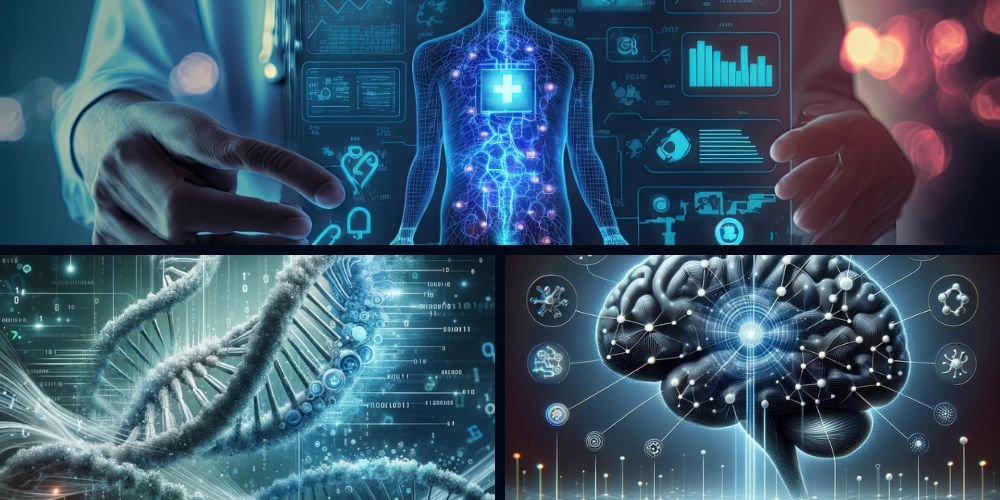In the genomics, proteomics, and personalized medicine era, bioinformatics has emerged as an indispensable field that bridges the gap between biology and information technology. This article explores the significance of bioinformatics, its evolution, applications, challenges, and its transformative impact on decoding the language of life for scientific discoveries and medical advancements.
Significance of Bioinformatics
Bioinformatics is crucial in deciphering and analyzing the vast and complex biological data generated through genomics, transcriptomics, and other omics technologies. Applying computational and statistical methods to biological information enables researchers to unravel the mysteries of the genome, understand cellular processes, and advance our knowledge of living organisms.
Genome Sequencing and Analysis
Bioinformatics’s role in genome sequencing and analysis is at the forefront. With the advent of high-throughput sequencing technologies, tools can process massive datasets, providing insights into genomes’ structure, function, and evolution. This has profound implications for understanding genetic disorders, identifying potential drug targets, and advancing personalized medicine.
Functional Genomics and Systems Biology
Bioinformatics facilitates the exploration of functional genomics and systems biology by integrating information from various levels of biological organization. This holistic approach allows researchers to study how genes, proteins, and other biomolecules interact within a biological system, leading to a deeper understanding of complex biological processes and disease mechanisms.
Drug Discovery and Development
In drug discovery, it accelerates the identification of potential drug targets and the optimization of drug candidates. Analyzing biological data, predicting protein structures, and simulating molecular interactions contributes to the rational design of pharmaceuticals, reducing the time and cost of bringing new drugs to market.
Evolution of Bioinformatics
The evolution of bioinformatics is closely tied to advancements in sequencing technologies, computational power, and the integration of diverse biological data sources.
Sequencing Technologies and Big Data
Next-generation sequencing technologies have revolutionized genomics and propelled bioinformatics into the era of big data. Bioinformaticians now grapple with analyzing massive datasets, requiring sophisticated algorithms, cloud computing, and data management strategies to extract meaningful insights from the wealth of biological information.
Open Access to Genomic Data and Databases
The democratization of genomics is evident through open access to genomic data and databases. Initiatives such as the Human Genome Project and publicly available repositories enable researchers worldwide to access, share, and analyze genomic information, fostering collaboration and accelerating scientific discoveries.
Integration of Multi-Omics Data
Bioinformatics has evolved to integrate multi-omics data, including genomics, transcriptomics, proteomics, and metabolomics. This integrative approach provides a comprehensive view of biological systems, allowing researchers to uncover intricate molecular networks and better understand the complexity of living organisms.
Applications of Bioinformatics
Bioinformatics finds diverse applications across various domains, influencing fields such as medicine, agriculture, ecology, and evolutionary biology.
Personalized Medicine and Genomic Medicine
Personalized medicine tailors medical treatments to individual genetic profiles. Analyzing genomic data allows healthcare professionals to identify specific genetic markers, predict disease risks, and optimize treatment strategies, ushering in an era of precision medicine.
Agricultural Biotechnology and Crop Improvement
In agriculture, it aids in crop improvement by analyzing plant genomes, identifying desirable traits, and developing genetically modified organisms. It has implications for enhancing crop yields, resistance to pests, and adaptability to changing environmental conditions.
Comparative Genomics and Evolutionary Studies
Bioinformatics facilitates comparative genomics, enabling researchers to study the similarities and differences in the genomes of different species. This approach contributes to evolutionary studies, helping unravel the genetic basis of biodiversity and the mechanisms driving the evolution of organisms over time.
Environmental Metagenomics and Microbial Ecology
In environmental science, it is applied to metagenomics and microbial ecology. By analyzing DNA from environmental samples, researchers can identify and characterize microbial communities, gaining insights into ecosystems, biogeochemical processes, and potential applications in bioremediation.
Challenges in Bioinformatics
While bioinformatics has revolutionized biological research, it faces challenges related to data complexity, computational demands, and the need for continuous adaptation to emerging technologies.
Data Integration and Standardization
Integrating data from diverse sources and standardizing formats present challenges in bioinformatics. Ensuring interoperability between databases and maintaining data quality are ongoing considerations for researchers seeking to harness the full potential of biological information.
Computational Power and Scalability
The increasing scale of biological data poses challenges regarding computational power and scalability. Tools must continually evolve to handle large datasets efficiently, requiring advancements in hardware, algorithms, and distributed computing strategies.
Ethical Considerations and Data Privacy
Bioinformatics deals with sensitive genetic and health-related information, so ethical considerations and data privacy are paramount. Balancing data sharing for scientific progress with the protection of individuals’ privacy requires robust ethical frameworks and regulatory guidelines.
Future Directions of Bioinformatics
The future of bioinformatics holds exciting possibilities, including advancements in computational methodologies, integrative multi-omics analyses, and the application of artificial intelligence.
Advancements in Computational Methodologies
Continuous advancements in computational methodologies will drive the future of bioinformatics. Improvements in algorithm efficiency, machine learning techniques, and the development of innovative computational models will enhance the accuracy and speed of biological data analysis.
Multi-Omics Integration and Systems Medicine
Integrating multi-omics data and the evolution of systems medicine will provide a holistic understanding of health and disease. It will play a pivotal role in deciphering the complexities of biological systems, leading to more effective diagnostic and therapeutic strategies.
Artificial Intelligence and Predictive Modeling
Applying artificial intelligence and predictive modeling in bioinformatics will enable more accurate predictions and insights from biological data. Machine learning algorithms will assist in identifying patterns, predicting outcomes, and uncovering novel associations within complex biological datasets.
Conclusion
Bioinformatics stands at the forefront of the biological sciences, driving advancements in genomics, personalized medicine, and our understanding of life at the molecular level. As technology continues to evolve, it will play a pivotal role in unraveling the complexities of biological systems, contributing to breakthroughs in medicine, agriculture, and environmental science. Despite challenges, the ongoing synergy between biology and information technology in bioinformatics promises a future where the language of life is decoded for the betterment of humanity.










